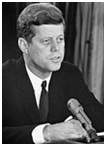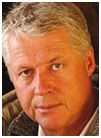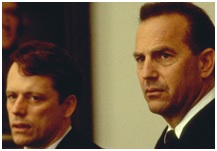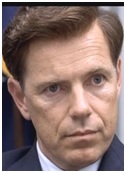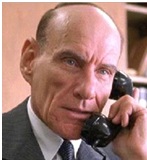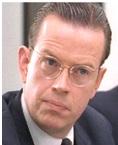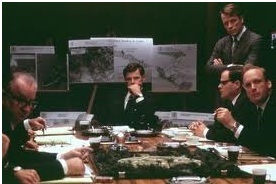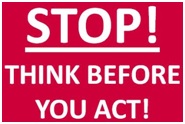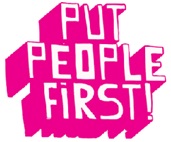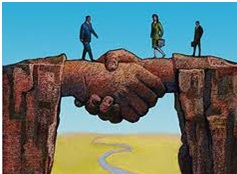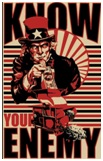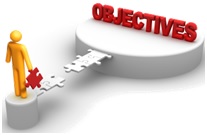|
 |
|
 |
Thirteen Days (2000)
Famous for... Its chilling portrayal of the Cuban Missile Crisis in 1962 during John F. Kennedy’s presidency (pictured right below during the
crisis). A nuclear war was narrowly averted over the Russians putting nuclear missiles in Cuba. The film was largely accurate, although it was incorrect to say that the military chiefs were unanimously in favour of war.
Based on... Ernest May and Philip Zelikow’s 1997 book, The Kennedy Tapes. Director Roger Donaldson (pictured right).
Oscars None. Key characters John F. Kennedy (Bruce Greenwood), American president. Robert F. Kennedy (Steven Culp), his brother and top advisor. Kenny O’Donnell (Kevin Costner), the president’s chief political adviser (pictured right).
The story The crisis begins on October 16, 1962, when John F. Kennedy
(JFK) is shown aerial photographs of the Russians (led by
Nikita Krushchev) moving nuclear missiles into Cuba that would be
capable of killing 80 million Americans. To deal with the crisis, JFK sets up a Special Executive Committee (Ex-Comm) including:
JFK (pictured right below):
Fortunately Commander Ecker doesn’t reveal that his plane was shot at in a reconnaissance flight over Cuba (after being told to do so by Kenny O'Donnell). There is also great relief when Russian ships turn around and refuse to break the blockade. Keenly aware of the importance of world opinion, JFK uses a televised United Nations (UN)
meeting to gain sympathy for the American position. America’s UN ambassador, Adlai Stevenson (pictured right).
The Russian refuses to reply. A Russian tanker near the blockade refuses an American request to stop. In contravention of JFK’s order that no
shots must be fired without his authorization, Admiral George Anderson orders the firing of
flares over the tanker. JFK’s Secretary of Defence, Robert McNamara (pictured right), is furious and tells Admiral Anderson to stop immediately. American intelligence then reveals that the Russian missiles in Cuba are becoming operational. On October 27 an American spy reconnaissance pilot, Major Rudolf Anderson, is killed and shot down over Cuba. In response JFK orders an air strike against Cuba for October 29, unless the Russians agree to remove their missiles. After JFK secretly agrees to withdraw nuclear missiles from Turkey, the Russians announce on radio on Sunday October 28 that they are:
The Cuban Missile Crisis is over, and nuclear war has been avoided, as the world held its breath in the face of total destruction. JFK dictates a letter of condolence to Major Anderson's parents.
Lessons for leadership and ethics 1. Listen, ask questions and analyze the options In a crucial meeting of the Executive Committee (pictured right), JFK:
This has two vital benefits:
2. Learning, consultation and teamwork JFK immediately set up the Executive Committee to benefit from the expertise of his top military and political advisers. He learned from his disastrous support for the 1961 CIA invasion of Cuba in the Bay of Pigs, when he consulted only a few people.
3. Fools rush in JFK:
JFK has enormous courage and nerve to resist demands for military action. He supports a blockade of Cuba rather than immediate bombings. 4. People come first JFK’s primary concern is to save the world from nuclear war and total destruction. He succeeds because he seeks a diplomatic, not military, solution.
5. The buck stops here JFK is ultimately responsible for America’s security. He makes the final decisions, based upon:
6. Negotiate from strength based on good advice JFK's reaction to the missiles had to send a strong message to the Russians without provoking war. He sacrifices the missiles in Turkey (that were ageing anyway) as a bargaining ploy to allow the Russians to withdraw from Cuba without losing face. JFK wanted a win-win situation for both sides, so that (as he said after the crisis): “It was just as much a victory for them, as it was for us”, This idea came from his UN ambassador, Adlai Stevenson, a good example of JFK's willingness to take advice from his political and military allies (like Robert Kennedy and Kenny O'Donnell) and even opponents. 7. Know your enemy JFK gathers as much information as he can about the Russian leader, Nikita Krushchev, and rightly gambles that he doesn’t want war. Kennedy:
8. Leaders need luck JFK is lucky that:
9. Be tough but tender JFK shows resolute toughness against the Russians, faced by the possibility of nuclear war. But he also shows great kindness, when he writes a letter of condolence to the parents of the killed spy pilot, Major Anderson. 10. Act with aims On discovery of the missiles, Robert Kennedy volunteers to co-ordinate and initiate America's response through the Special Executive Committee. JFK reminds him that action needs aims: “We've got to figure out what we're going to do before we worry how we're going to do it”.
Key quote on ethics Men of good will. That’s all there is between us and the devil, Kenny O’Donnell.
Key quote on leadership There’s something immoral about abandoning your own judgement, JFK.
Key quotes on negotiating We were eyeball to eyeball, and I think the other fellow just blinked, Dean Rusk, Secretary of State (on Russian ships turning away from the naval blockade of Cuba). I am prepared to wait for my answer until hell freezes over!, Adlai Stevenson (to the Russian UN ambassador about the building of Cuban missile sites). It was just as much a victory for them, as it was for us, JFK (after resolving the crisis)
Key quote on strategy We've got to figure out what we're going to do before we worry how we're going to do it, JFK
Key quote on war We do what they want us to do, there's none of us is going to be alive to tell them they were wrong, JFK (about the military chiefs' support for nuclear air strikes). Appeasement only makes the aggressor more aggressive, Dean Rusk
Two film websites to recommend 1. filmsite.org (run by Tim Dirks). 2. aveleyman.com (run by Tony Sullivan) |
|
|
||
|
|
|
||
|
||
| Copyright © wisdomtowin.com All Rights Reserved | ||
|

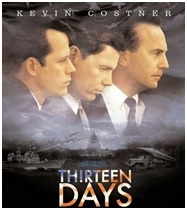 Thirteen Days - Leadership and Ethics
Thirteen Days - Leadership and Ethics